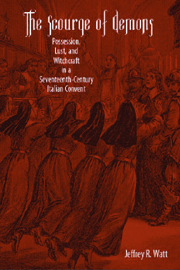Book contents
- Frontmatter
- Contents
- List of Illustrations
- Acknowledgments
- Introduction: Nuns, Witchcraft, and the Inquisition
- Chapter 1 Female Religious, Claustration, and Santa Chiara of Carpi
- Chapter 2 The Outbreak and Maleficia
- Chapter 3 The Confessor and Love Magic
- Chapter 4 The Exorcists and the Demons
- Chapter 5 Sisters Dealta and Ippolita under Attack
- Chapter 6 Bellacappa's Defense
- Chapter 7 The Waning of the Possessions
- Conclusion
- Appendix A
- Appendix B
- List of Abbreviations
- Notes
- Selected Bibliography
- Index
Chapter 5 - Sisters Dealta and Ippolita under Attack
Published online by Cambridge University Press: 12 September 2012
- Frontmatter
- Contents
- List of Illustrations
- Acknowledgments
- Introduction: Nuns, Witchcraft, and the Inquisition
- Chapter 1 Female Religious, Claustration, and Santa Chiara of Carpi
- Chapter 2 The Outbreak and Maleficia
- Chapter 3 The Confessor and Love Magic
- Chapter 4 The Exorcists and the Demons
- Chapter 5 Sisters Dealta and Ippolita under Attack
- Chapter 6 Bellacappa's Defense
- Chapter 7 The Waning of the Possessions
- Conclusion
- Appendix A
- Appendix B
- List of Abbreviations
- Notes
- Selected Bibliography
- Index
Summary
Suspicions against Sister Dealta Martinelli predated the Holy Office's investigation of Santa Chiara's possessions, and she was the first person witnesses named as a suspect (see chapter 2). In the wake of the attack of St. Mark's Day (25 April 1638), which occurred just six days after the opening of the hearings, Fiscal Giudici ordered that Dealta be held in isolation in the convent's infirmary. In one sense, this was a means of protecting her from possible further attacks by the demoniac nuns. But Giudici and Tinti clearly harbored strong suspicions about the nonconformist nun, since they forbade the other sisters to communicate with her in any way under ban of excommunication. This reflected the inquisitorial practice of keeping suspects incommunicado, based on the notion that they were to reflect on their own actions and, ideally, repent and confess their misdeeds. Apart from one very brief release, described below, Dealta would spend the remainder of her stay at Santa Chiara in isolation. As we have seen, her sister, Ippolita, was briefly subjected to a similar form of incarceration in May 1638. Her release, which was ordered by the cardinal-inquisitors in Rome, did not put an end to suspicions against her. As we shall see, in the summer of 1638 Ippolita was increasingly ostracized within the convent until she, too, was again incarcerated within the nunnery.
- Type
- Chapter
- Information
- The Scourge of DemonsPossession, Lust, and Witchcraft in a Seventeenth-Century Italian Convent, pp. 141 - 156Publisher: Boydell & BrewerPrint publication year: 2009



